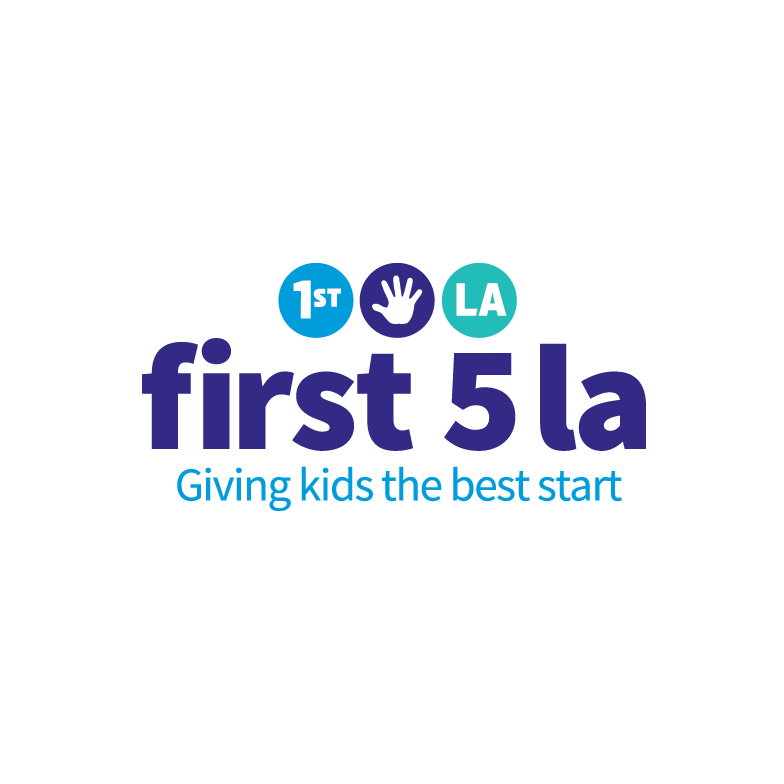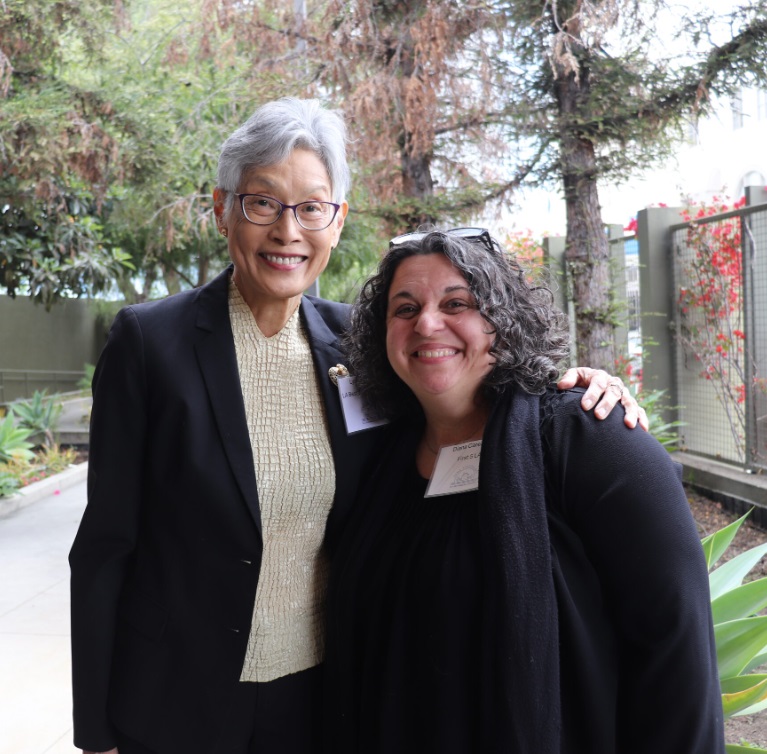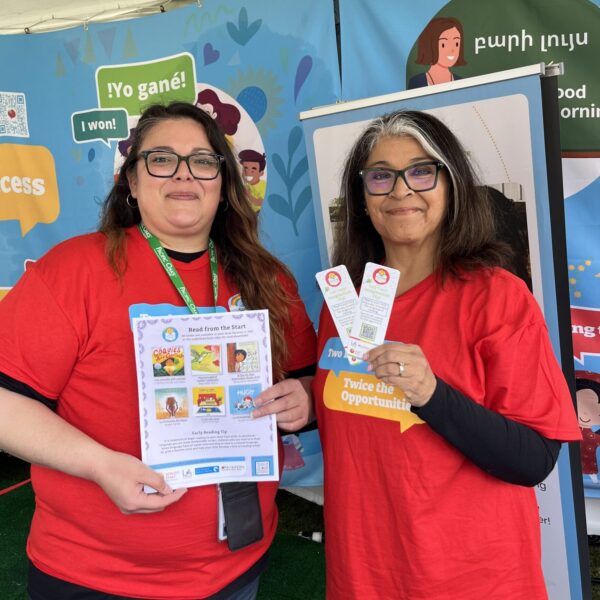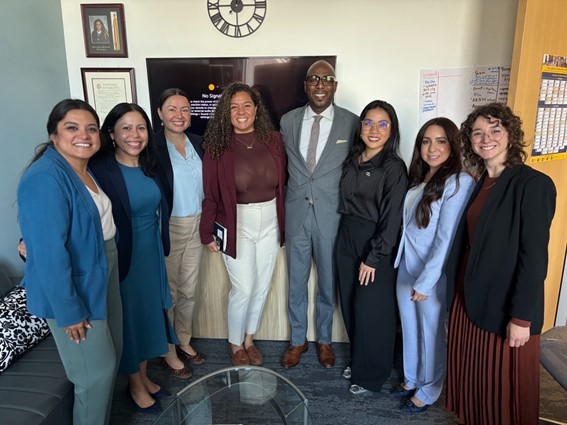Submitted via www.regulations.gov
Samantha Deshommes, Chief
Regulatory Coordination Division
U.S. Department of Homeland Security (DHS)
U.S. Citizenship and Immigration Services (USCIS), Office of Policy and Strategy
20 Massachusetts Avenue NW
Washington, DC 20529-2140
Re: DHS Docket No. USCIS-2010-0012, RIN 1615-AA22, Comments in Response to
Proposed Rulemaking: Inadmissibility on Public Charge Grounds
Dear Chief Deshommes,
First 5 LA appreciates the opportunity to comment on the proposed rule change to the
public charge. First 5 LA strongly opposes the expansion of the public charge
definition for immigrants seeking to legally adjust their status, and urges DHS to
rescind the proposal.
This ill-advised proposed rule change is antithetical to America’s founding as a nation of
immigrants. It compromises our state’s economy and it erects barriers to the services and
supports vital to children being healthy, safe and ready to learn. And most importantly, it
jeopardizes the well-being of children, regardless of their immigration status.
All families have a right to engage with the public systems that exist to serve their health,
education, and caregiving needs without fear of judgement or reprisals. With nearly one in four
children nationwide having at least one immigrant parent, this proposed rule change will hurt,
instead of help, millions of young children.
Established 20 years ago, First 5 LA was tasked directly by California’s voters to urge leaders
and lawmakers to prioritize the wellbeing of children in policy and budget decisions. In
partnership with others, we work to strengthen families, communities, and systems of service
and supports so all children in Los Angeles County enter kindergarten ready to succeed in
school and life by 2028.
We have learned from our network of early care and education providers, parent leaders and
community groups that many parents are being forced to make life altering decisions to keep
healthy, feed, or house their children versus legally adjusting their own status. Making such
decisions are unimaginable for any family to endure, as many already do so out of fear of
being denied legal status or deported, hindering their health, productivity and stability.
As a leading public grant-maker and advocate for young children and families in Los Angeles
County, First 5 LA is deeply concerned that the inclusion of public benefits such as Medicaid
(Medi-Cal), Special Nutritional Assistance Program (SNAP), and Section 8 housing assistance subsidies will prevent families from accessing vital support services that provide for the
healthy and optimal development of children and families. These public benefits are meant to
support all Americans, including new immigrants and their families as they play by the rules
and work to legally adjust their status.
We believe the rule expansion will have an incredibly adverse effect on child and family
stability—including those who are not subject to the public charge test—and will have a
disproportionate impact on states like California where one in two children have one immigrant
parent.
We know Medicaid, SNAP, and housing assistance programs allow low-income immigrant
families the opportunity to keep their children free of sickness, hunger, and homelessness
while they work to support their families and lawfully adjust their immigrant status. The
majority of young children who would benefit from these programs are, in fact, American born
citizens and would nonetheless be penalized by this proposed rule change. Installing
obstacles to these programs make our country, state, and specifically Los Angeles County
unhealthier, hungrier, and poorer, and will increase the cost of federal benefits in the future.
California and Los Angeles County will see the largest impact from the rule change. Our
state is home to more than 39 million people with over 10 million immigrants.3 California’s
immigrants pay billions in taxes to help support public benefits, yet access these services less
often than U.S. born families. Los Angeles County—with one of the highest concentration of
immigrants in the country—will see families forced to make life altering decisions between
keeping their children healthy, nourished, and safe versus seeking legal permanent residency
status.
The proposed rule is already creating a chilling effect among immigrant communities. We
have heard from our early learning and health provider partners that immigrant families are
removing themselves and their children from public programs they are legally entitled to
access, putting the health and development of their children in jeopardy. As fear surrounding
the public charge grows, children have stopped participating in child care and families have
been canceling medical appointments. Nationally, 24 million people and 9 million children from
immigrant families are projected to withdraw or refuse public benefits, representing 13% of the
U.S. child population. Similar confusion and fear was seen in 1996 after the implementation of
the Personal Responsibility and Work Opportunity Reconciliation Act (PRWORA), leading to a
large reduction in the access of public services, even when qualified, putting the health and
well-being of immigrant families at-risk for generations.
Safety net programs like Medicaid (Medi-Cal) and SNAP are intended to ensure families
have access to basic services and supports, which lead to increased positive
outcomes for children. Ninety percent of a child’s brain is developed by age five, making
consistent access to health services especially important during this critical time. The rule
expansion will have a disproportionate impact on children, especially as it relates to accessing
and receiving timely and critical health services.
According to the California Health Care Foundation, nation-wide 4.8 million children who are
in need of medical assistance and rely on Medicaid and the Children’s Health Insurance Plan
(CHIP) for services live in households with one immigrant adult. Of these children, up to 1.7
million will likely dis-enroll from these programs, including newborns and children living with
life threatening diseases and those who require prescription medications. This lack of health care access will lead to higher health disparities among these children. Moreover, the
advance of treatable conditions, including communicable diseases, will increase.
Research confirms that when parents have access to health care services their children have
higher utilization rates and better health outcomes. In Los Angeles County, Medi-Cal covers
over 1.7 million immigrant families, many with children, providing wellness checks, maternity
and newborn care, access to developmental screenings and interventions, and several
preventative services. Elimination of these services will lead to negative health outcomes,
compromising the healthy development of our youngest residents, increasing healthcare
costs, emergency room usage, and the probability of their reliance on public benefits in the
future.
Similarly, the Special Nutritional Assistance Program (SNAP), or CalFresh in California,
provides nutritional support for over 4 million Californians, of which 74% include families with
children. Throughout California, over 1.6 million children are food insecure, with 439,000
living in Los Angeles County.11 The CalFresh program provides nutritional support for over 1
million residents in the County, including support to 35,000 immigrant families.12 The reduction
in use of the CalFresh program means that low income immigrant families will lack the support
to provide nutritious meals for their children so they can perform well in school and lead
healthier lives.
When children are well-nourished they have increased positive educational outcomes. Additionally, immigrant parents themselves will lack the nutritional support needed to be
productive members of the workforce to provide for their children. CalFresh allows families the
opportunity to free up their income to provide for other basic needs. If implemented, the rule
change could lead to the disenrollment of up to 99,000 individuals in Los Angeles County.
One in four children already experience housing instability in California, leading to
overcrowded homes and homelessness. The Section 8 housing assistance program is
designed to provide stable and safe housing options for low-income residents, especially
families with children. In Los Angeles County, there are over 50,000 homeless individuals,
including 4,000 children. However, public benefits, such as Section 8, which currently serve
over 23,000 families in the County with a utilization rate of 93%, were established to ensure
that if needed, residents could provide a nurturing home for their children and families to live,
learn, and be healthy. Families who receive housing assistance are less likely to live in
overcrowded homes, become homeless, and move frequently. The inclusion of Section 8 will
increase the prevalence of homelessness and the trauma associated with it and contribute
directly to family instability.
The public charge expansion will not discourage immigrants from migrating to the U.S. but
rather those who need vital support services simply will not seek essential support for
themselves or their children. The proposed rule will increase illness, hunger, and
homelessness with profound negative outcomes for children during childhood and into
adulthood. Entire communities benefit when all families have access to food, shelter and
health care, and pay the costs when access is withheld.
Newcomers to America push our economy forward with their skills and ideas. We need to
implement policies to harness that energy for our nation in order to help build a stronger
economy and a brighter future for children and adults alike. Our immigration regulations at
every level should reflect the deep American belief that people are people, and should be
treated with respect.
First 5 LA is opposed to this rule change because it ultimately harms the wellbeing of young
children in Los Angeles County, and across California, by leading to increased income,
education and health disparities in the U.S.
There is a shared responsibility, and a shared benefit, from improving the health and well-
being of all young children. This proposed public charge expansion can and will have a
devastating effect on young children.
For all these reasons, and on behalf of the 650,000 Los Angeles County children, we stand in
firm opposition to the expansion of the public charge.
If we can be of further assistance, please contact Jamie Zamora, Senior Government Affairs
Strategist, at jz*****@******la.org or 213.482.7505 and Anais Duran, Government Affairs
Strategist at ad****@******la.org or 213.482.7572.
Sincerely,
Kim Belshé
Executive Director
Endnotes:
1 Samantha Artiga & Anthony Damico. Nearly 20 Million Children Live in Immigrant Families
That Could Be Affected By Evolving Immigration Policies. Washington, DC: Henry J. Kaiser
Family Foundation, 2018.
link
2 California Children in Immigrant Families: The Health Provider Perspective Fact Sheet. Los
Angeles, CA: The Children’s Partnership, 2018.
link
3 Han Johnson & Sergio Sanchez. Immigrants in California. Sacramento, CA: Public Policy
Institute of California, 2018.
link
4 U.S. Immigrant Population By State and County. Washington, DC: Migration Policy Institute,
2012-2016.
link
5 FPI Estimates Human & Economic Impacts of Public Charge Rule: 24 Million Would
Experience Chilling Effects. New York, New York: Fiscal Policy Institute, 2018.
link
6 Fix, M., & Passel. The Scope and Impact Welfare Reform’s Immigrant Provisions.
Washington, DC: Urban Institute, 2002.
7 Jennifer Laird, Neeraji Kaushal, Jane Waldforgel, Christopher Wimer. Forgoing Food
Assistance out of Fear. Changes to Public Charge Rule May Put 500,000 More U.S. Citizen
Children at Risk of Moving Into Poverty. Columbia Population Research Center, 2018.
link
8 Leah Zallman and Karen Finnegan. Changing Public Charge Immigration Rules: The
Potential Impact on Children Who Need Care. Sacramento, CA: California Health Care
Foundation, 2018.
link
9 Institute of Medicine. Health Insurance is a Family Matter. Washington, DC: The National
Academies Press, 2002.
link
10 SNAP Fact Sheet for California. Washington, DC: Center on Budget and Policy Priorities,
2018.
link
11 Carol Medlin, Ph.D. and Erin McDonald, Ph.D. Map the Meal Gap 2018: A Report on
County and Congressional District Food Insecurity and County Food Cost in the United States
2016. Chicago, IL: Feeding America, 2016.
link
12 Annual Impact Estimates of Potential Disenrollment from Select Benefits by Immigrant
Populations in Los Angeles (Fact Sheet). LA Office of Immigrant Affairs. Los Angeles, CA,
2018.
13 Research Summary: School Nutrition and Academic Achievement. Oakland, CA: California
Food Policy Advocates, 2016.
link
14 Ninez Ponce, Laurel Lucia, Tia Shimada. How the Proposed Changes to the Public Charge
Rule Will Affect Health, Hunger, and the Economy in California. Los Angeles, CA: The UCLA
Center for Health Policy Research, 2018.
link
15 A 2018 Snapshot of Homelessness in LA County. Los Angeles, CA: USC Neighborhood
Data for Social Change, 2018.
link
16 By the Numbers: Affordable Housing. Los Angeles, CA: Los Angeles Community
Development Commission
link
17 Michelle Wood, Jennifer Turnham, Gregory Mills. Housing Affordability and Family Well-
Being: Results from the Housing Voucher Evaluation. Housing Policy Debate 19 (2008).
link
18 Caroline Ratcliffe, Signe-Mary McKernan. Effects of Poverty, Hunger and Homelessness on
Children and Youth. Washington, DC: American Psychological Association, 2012.
link






